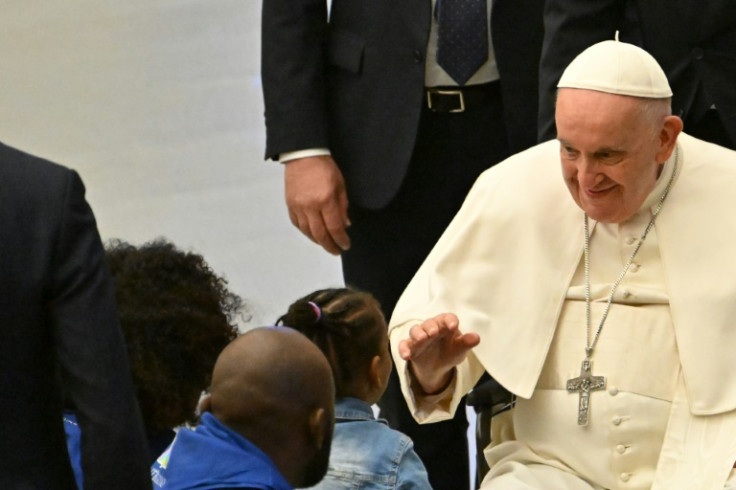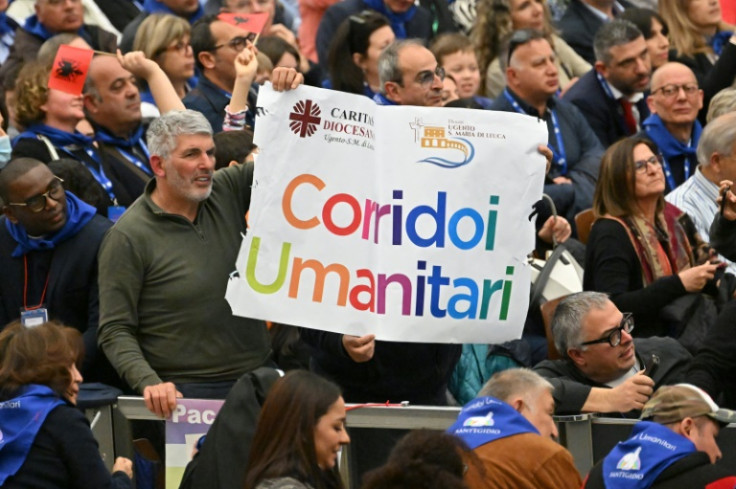Pope Greets Refugees Helped Through Christian 'Corridors'

Pope Francis on Saturday greeted thousands of refugees brought to Europe by Christian charities, recognising their difficult journeys and hailing their desire to "live free from fear and insecurity".
At the Paul VI hall in the Vatican, the 86-year-old pontiff also thanked those who helped the refugees settle into their new lives, saying that "welcome is the first step towards peace".
The audience included many of the 6,000 people who have been helped to Europe through "humanitarian corridors" run by Christian groups since 2016.
The scheme, initiated by the Catholic Sant'Egidio community in Italy and later extended to France and Belgium, involves people from Syria, Iraq, Afghanistan, Somalia, South Sudan, Libya and Ukraine among others.
"I am happy to meet so many refugees and their families... each of you deserves attention for the hard history that you have lived," Francis told them.
"You have shown a firm will to live free from fear and insecurity."
He paid particular tribute to those who survived grim conditions in detention camps in Libya, the preferred departure point for many of the tens of thousands of people who try to cross the Mediterranean into Europe each year.
The humanitarian corridors were set up to provide an alternative to the deadly sea crossing, where more than 26,000 people have lost their lives since 2014, according to the United Nations.
Saturday's event comes just weeks after a migrant boat was shipwrecked off the southern coast of Italy, leaving at least 87 people dead.
In a copy of his speech issued by the Vatican, the pope referenced the disaster, saying "everything possible needs to be done to ensure that it will not be repeated".
He delivered to the audience, however, a much shorter version and did not mention the shipwreck.
Many migrants and asylum seekers turn to leaky, overcrowded boats because legal routes to Europe are limited.
The number of asylum claims in Europe in 2022 reached levels last seen during the 2015-2016 refugee crisis, when more than a million came to the continent.
But the issue of who should take responsibility for the arrivals is a cause of major tension between member states.
Under the corridor scheme, the European governments involved agree to issue visas, which the charities then use to bring over the most vulnerable -- whether victims of persecution, families with children, the elderly or infirm.
When the refugees arrive, the charities provide them with housing, language and skills training, and help them apply for asylum.
The first humanitarian corridor opened was through Lebanon, with Italy offering visas to 1,000 Syrians who had fled there.
A Syrian woman named Anna spoke at Saturday's event, describing her family's journey from Aleppo to Lebanon and then Italy.
The scheme "seemed a dream, the possibility of living in peace", she said, before being greeted by the pope.
Francis said the corridors aimed to ensure "life, salvation and then dignity".
About 5,000 of the refugees brought in since 2016 are in Italy, where the Italian Federation of Evangelical Churches and the Waldensian Church are also involved.
Another 600 went to France, according to Sant'Egidio.

© Copyright AFP 2024. All rights reserved.





















